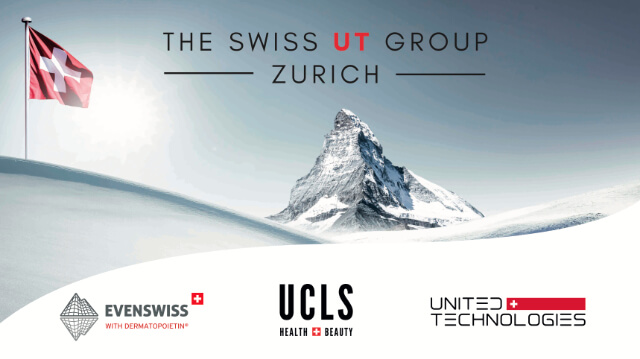Why EVENSWISS?
EVENSWISS® is the brand owned by EVENSWISS GmbH and made with natural ingredients extracted from flowers and plants. Moreover EVENSWISS® is manufactured with the patented and unique DERMATOPOIETIN® Polypeptide Complex.
All EVENSWISS® products contain the unique and patented DERMATOPOIETIN® Peptide Complex.
DERMATOPOIETIN® is a full equivalent of the human epidermal cytokine interleukin-1 alpha – the natural polypeptide that controls the homeostasis of skin, regulate immune reaction and contribute to the production of Elastin, Collagen and Hyaluronic Acid.
It affects deep skin structures without penetrating skin by triggering a cascade of reactions which propagates from the surface to the depth of skin: named Signalling Cosmetics®.
DERMATOPOIETIN® promotes the production of collagen, elastin, hyaluronic acid and several growth factors and thus supports the skin’s natural renewal process.
Conventional products VS products with DERMATOPOIETIN®
DERMATOPOIETIN® is a polypeptide fully equivalent to the human natural factor interleukin-1a. This factor (cytokine) plays an important role for the maintenance of the structural and functional integrity of skin.
DERMATOPOIETIN® as an active cosmetic ingredient does not itself penetrate skin. It acts by a signaling mechanism from the surface of the skin by activating a cascade of reactions that penetrate deep into the skin. The result is among others a strong increase of collagen, elastin and hyaluronic acid in the dermis (90% increase).
DERMATOPOIETIN® mechanism of action and anti-aging effects

- DERMATOPOIETIN® activates on the surface of skin (without penetration) a cascade of reactions that propagate deep into the skin. It massively increases the production of Elastin, Collagen and Hyaluronic Acid in a few days only.
- DERMATOPOIETIN® stimulates keratinocytes to release interleukin-1a which activates fibroblasts to initiate a skin renewal program.
- This skin renewal program affects both the dermis and epidermis.
- The anti-aging action of DERMATOPOIETIN® is thus triggered on the surface but comprises the entire skin.
- Clinical tests showed an increase of collagen, elastin and hyaluronic acid up to 90% within 2 weeks.
- The structural and functional effects of DERMATOPOIETIN® translate into an improved skin barrier, a better immune defense as well as a rejuvenated and smoother appearance of skin.
Reference studies
Limitations of conventional anti-aging products
- poor penetration of the skin barrier
- little impact, if any, on the deeper layers of skin (dermis)
- penetration enhancers, often used with conventional products, facilitate penetration also of pollutants and microorganisms
Collagen, elastin and hyaluronic acid, provides the skin with firmness and elasticity
20 - year old reference skin

Young skin
More than 90% of young skin (dry weight) is made up of collagen. Collagen forms, together with elastin, a well-organized network which provides the skin with structural support and the environment for vital cell functions.
53 - year old reference skin

Aging skin
With increasing age the skin loses its ability to produce functional collagen which is replaced by fat and proteoglycan deposits leading to a rough skin surface and/or the typical signs of skin aging.
DERMATOPOIETIN® approach to rejuvenation of aging skin

By replenishing collagen and improving its function in the dermis DERMATOPOIETIN® reduces the signs of aging skin and restores its youthful appearance.
Clinical studies
Summary of the 2-photon fluorescence microscopy studies performed by Neurotar Ltd, Helsinki.
Two-photon fluorescence microscopy studies of the effect of DERMATOPOIETIN® on the collagen and elastin content in human volunteer forearm skin.
Neurotar is a spin-off of the University of Helsinki, Finland, and a leading company specialising on contract research based on the new imaging technique called 2-photon fluorescence microscopy. This method allows the 3-dimensional visualization of subcellular structures in vivo to a depth of about 250 μm with a resolution of less than 1 μm (non-invasive optical biopsy).
Neurotar performed a study on forearm skin to explore the effect of DERMATOPOIETIN® on collagen deposition in 2011 (experiment 1), followed by two additional studies in 2012 (NT11-0183 and NT12-0222, experiments 2 and 3, respectively) to investigate the dose-dependency of the effect of DERMATOPOIETIN®.
The present report summarises the long and detailed reports of Neurotar which are on file.
EXPERIMENT 1

Two-photon microscopic pictures from the dermis at 80 μm skin depth. Comparison of DERMATOPOIETIN® versus Placebo and Baseline versus 4-week treatment. Pictures were obtained from the same skin spot. Clearly visible is the increase of collagen (red) and elastin (green). DERMATOPOIETIN® concentration 150 μg/L.
EXPERIMENT 2

Three-dimensional 2-photon microscopic composite pictures showing the green autofluorescence in the epidermis and dermis as well as collagen (red, second harmonic generation) in the dermis. Clearly visible is the increase of collagen after two weeks in the skin of the forearm treated with DERMATOPOIETIN® at a concentration of 30 μg/L.
Company Profile
Sales Presenter

